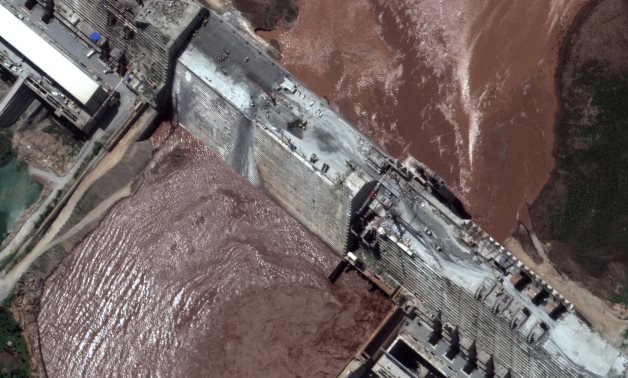
A handout satellite image shows a closeup view of the Grand Ethiopian Renaissance Dam (GERD) and the Blue Nile River in Ethiopia June 26, 2020. Satellite image ©2020 Maxar Technologies via REUTERS
CAIRO – 6 July 2021: Egyptian Minister of Water Resources and Irrigation Mohamed Abdel Atty held a videoconference meeting with Ms. Inger Anderson, Director of the United Nations Environment Program to discuss the current situation of the Ethiopian Renaissance Dam issue, according to a statement by the Egyptian Ministry of Irrigation.
Members of the Egyptian negotiating delegation and representatives of the Egyptian Embassy in Kenya participated in the virtual meeting.
For his part, Egyptian Minister Abdel Atty reviewed Egypt’s water situation and the size of the challenges facing the water sector in Egypt, especially the limited available water resources, the negative effects of climate change, and the unilateral measures taken by the Ethiopian side regarding filling and operating the Renaissance Dam.
Minister Abdel atty explained that Egypt is one of the driest countries in the world, as it suffers from a lack of water resources at a time when Ethiopia enjoys huge water resources represented in rainwater, renewable groundwater, river basins other than the Nile River, and the large quantities of water it has stored in dams and natural lakes.
“Egypt is not against development in Ethiopia or the Nile Basin countries, but development projects must be implemented in accordance with the rules of international law, taking into account the concerns of the downstream countries,” said Dr. Abdel-Aty, stressing that Egypt has already assisted the Nile Basin source countries in building dams in a cooperative and consensual framework.
Egypt seeks to achieve cooperation with Ethiopia through a fair and binding legal agreement to fill and operate the Ethiopian dam, in the interest of all, he added.
He continued, “Egypt has shown flexibility in negotiation that has been met with great intransigence from the Ethiopian side, given that Ethiopia does not have the political will to reach an agreement, and it always seeks to evade No obligation on them towards the downstream countries.”
Dr. Abdel-Aty also referred to the effects of unilateral Ethiopian actions on both Egypt and Sudan, especially if filling or operation coincided with periods of drought. He also referred to the serious damages that Sudan suffered as a result of unilateral filling last year, which caused Sudan to suffer from a severe drought that followed a severe flood situation due to the Ethiopian side implementing the first filling process without coordination with the downstream countries. And then, Ethiopian side releasing quantities of silt water during last November without informing the downstream countries, which caused an increase in turbidity in drinking water stations in Sudan.
On her part, Mrs. Inger Anderson explained that the Secretary-General of the United Nations stressed the readiness of the United Nations to participate in the path of the African Union to work to support the negotiations of the Renaissance Dam if requested by the three countries, where the request of Egypt and Sudan was referred to the importance of integrating international parties ( African Union - United Nations - European Union - United States of America) to advance the negotiation path.
Ethiopia’s 2nd filling escalation
Egypt’s Irrigation Minister Mohamed Abdel Ati received on Monday an official letter from his Ethiopian counterpart Seleshi Bekele confirming that Ethiopia started the second phase of filling the reservoir of its controversial mega dam.
Ethiopia has reiterated its plans to implement the second phase of filling in July and through the rainy season whether a deal is reached or not.
Rounds of African Union-sponsored talks have collapsed with Egypt and Sudan blaming the collapse of negotiations on Ethiopia’s intransigence.
In response to Bekele’s Monday letter, Abdel Ati sent an official letter to the Ethiopian minister voicing Egypt’s categorical rejection of Ethiopia’s unilateral act, a statement by the Egyptian irrigation ministry spokesman read.
The Egyptian Foreign Ministry re-sent the letter of Abdel Ati to the chief of the United Nations Security Council to brief the council on this “dangerous” update in light of the council’s planned session on GERD on Thursday, the statement read.
Egypt’s and Sudan’s rejection
Egyptian and Sudanese foreign ministers expressed their rejection to Ethiopia’s announcement of starting the filling process for the second year.
Both leaders considered the announcement as explicit violation of the provisions of the Declaration of Principles Agreement concluded between the three countries in 2015, and a violation of international laws and norms governing the exploitation of transboundary river resources.
They see Ethiopia’s escalation as “bad intention and desire to impose a fait accompli on the two downstream countries, and its indifference to the negative effects and damages that its interests may suffer due to the unilateral filling of the Renaissance Dam.
This came during a meeting between Egyptian Foreign Minister Sameh Shoukry and his Sudanese counterpart Dr. Maryam Sadiq al-Mahdi in New York, to discuss the developments of the Ethiopian Renaissance Dam issue, and in preparation for the United Nations Security Council session scheduled to be held on Thursday at the request of Egypt and Sudan.
The two ministers agreed on the need to continue conducting intensive contacts and consultations with the member states of the Security Council to urge them to support the position of Egypt and Sudan and to support their call for the need to reach a legally binding agreement on filling and operating the Renaissance Dam that takes into account the interests of the three countries and preserves the rights of the downstream countries from the damages of this project to Egypt and Sudan.
Comments
Leave a Comment